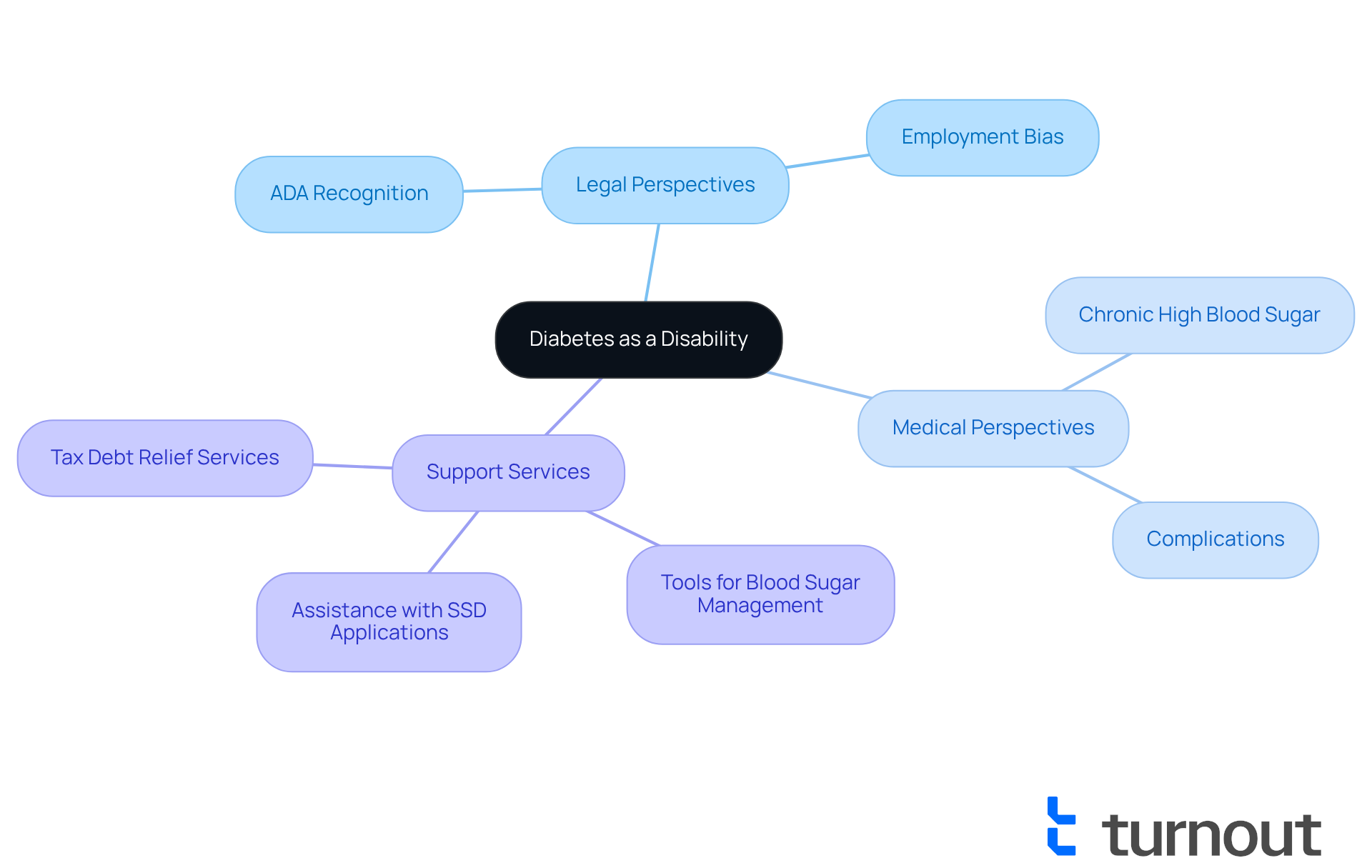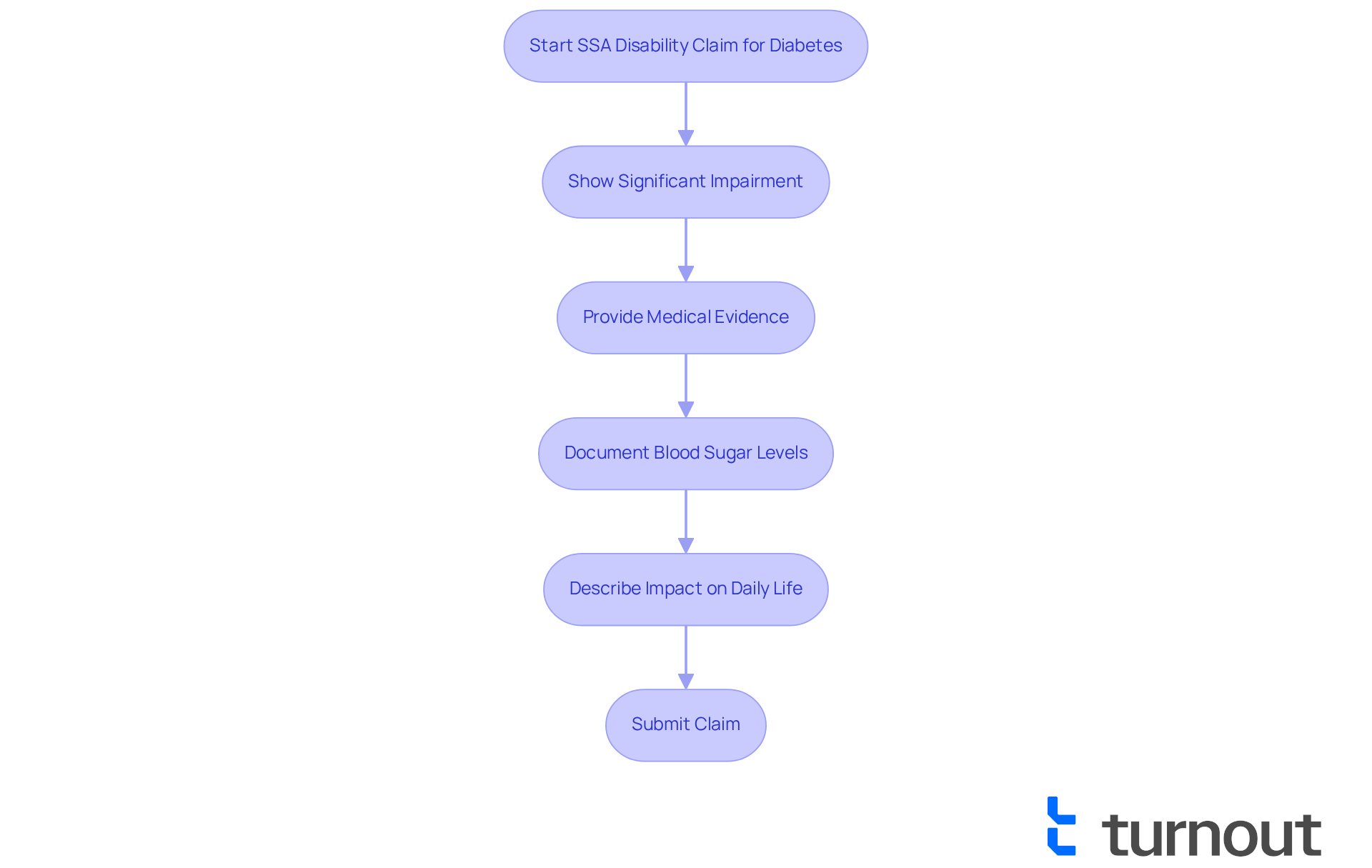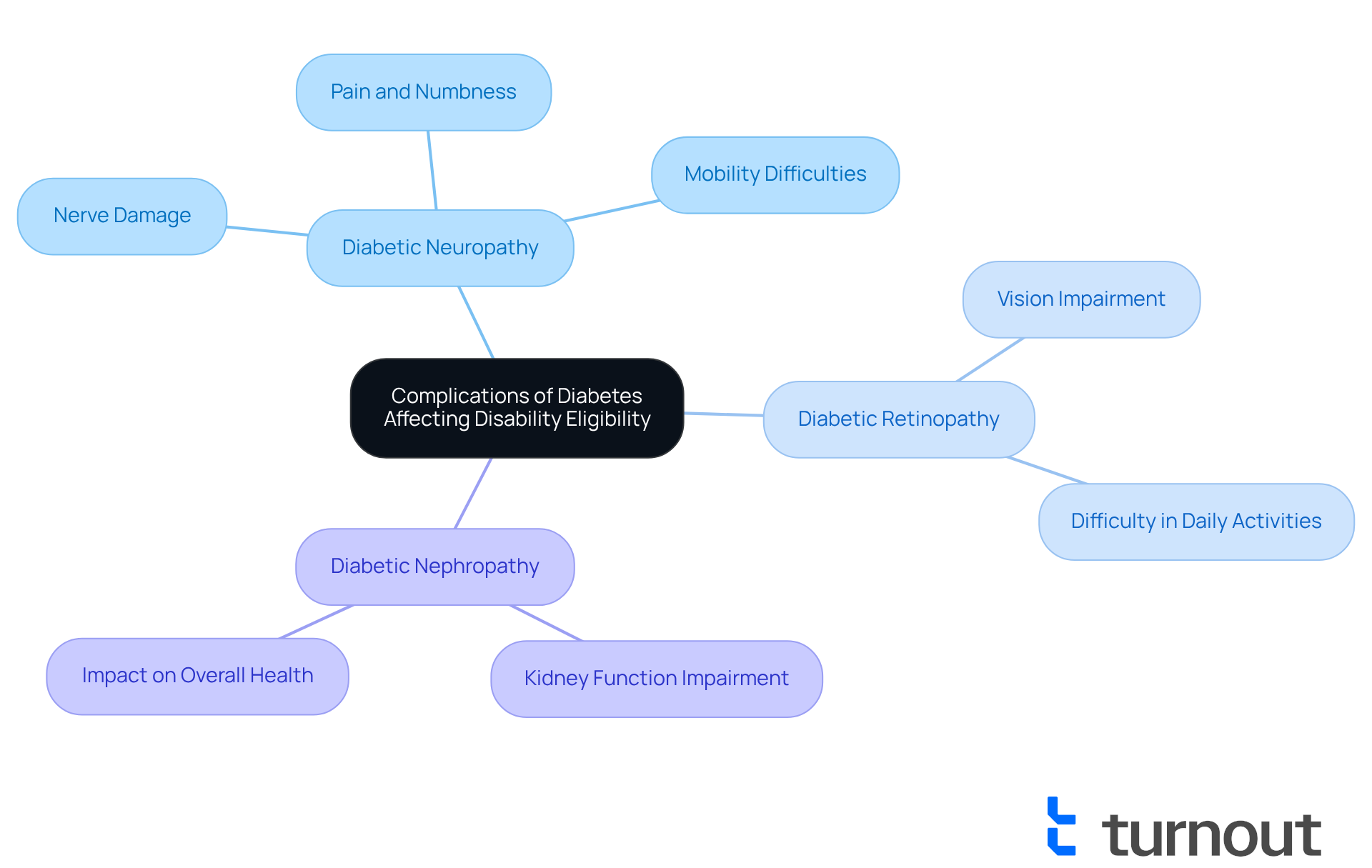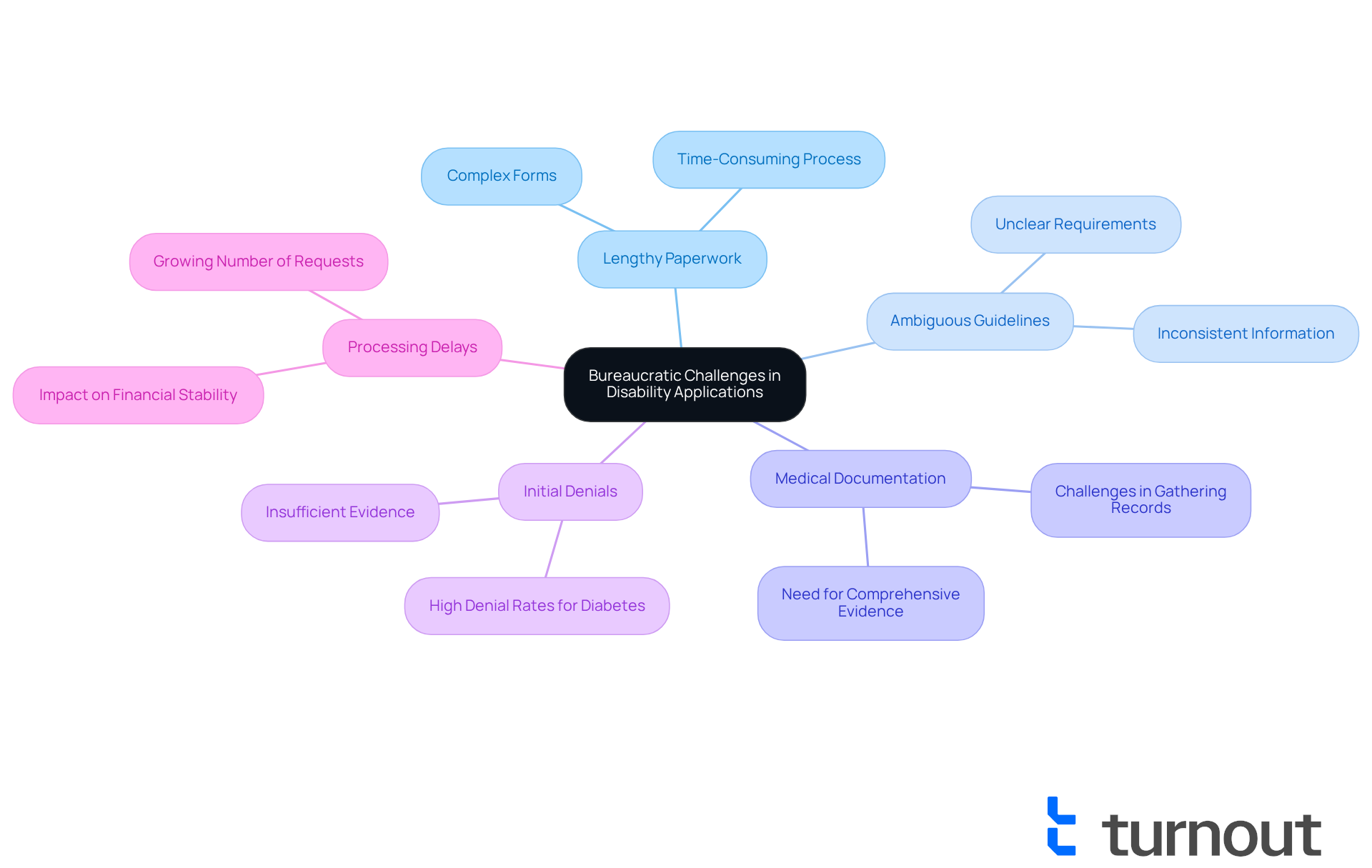Overview
Navigating the process of obtaining disability benefits for diabetes can feel overwhelming. We understand that the strict eligibility criteria set by the Social Security Administration (SSA) can seem daunting. Comprehensive medical documentation is required to demonstrate how diabetes significantly impairs your daily functioning.
Many applicants face bureaucratic hurdles, including high initial denial rates. It's common to feel discouraged by the need for detailed evidence of complications, such as neuropathy or retinopathy. These challenges can make the journey toward securing support feel even more difficult.
However, you are not alone in this journey. We're here to help you understand the process and provide guidance on gathering the necessary documentation. By taking it one step at a time, you can navigate these challenges with greater confidence. Remember, reaching out for assistance is a vital step toward securing the support you deserve.
Introduction
Navigating the complexities of securing disability benefits for diabetes can feel overwhelming. We understand that the chronic nature of this condition, along with its potential complications, adds to the stress. Many individuals grapple with the question: how difficult is it to obtain the support they truly need?
This article will explore the key challenges faced by applicants:
- Understanding the medical and legal definitions of diabetes as a disability
- Overcoming bureaucratic hurdles in the application process
We aim to provide clarity. It's common to feel discouraged, but there are ways to enhance your chances of a successful claim. You're not alone in this journey, and we're here to help.
Define Diabetes as a Disability: Legal and Medical Perspectives
Under various laws, including the Americans with Disabilities Act (ADA), diabetes is recognized as a disability, leading many to wonder how hard is it to get disability for diabetes. This classification encompasses both type 1 and type 2 conditions, acknowledging how significantly they can restrict major life activities. We understand that living with blood sugar issues can be challenging, which is why legal protections are in place to prevent bias in employment and other areas.
Medically, diabetes is characterized by chronic high blood sugar levels, which can lead to severe complications affecting various bodily systems. Understanding how hard it is to get disability for diabetes is essential for anyone navigating the disability benefits landscape. It highlights your eligibility for support and accommodations, ensuring you know that you are not alone in this journey.
At Turnout, we're here to help. We offer tools and services designed to assist individuals with blood sugar management as they navigate the intricacies of SSD applications and tax debt relief. Our goal is to ensure that you obtain the financial support you deserve without the need for legal assistance. Our trained nonlawyer advocates simplify the process, making it easier for you to access the benefits available to you. Together, we can work towards a brighter future.

Examine SSA Criteria for Disability Claims Related to Diabetes
The SSA has established specific criteria for evaluating disability claims related to diabetes, which leads to the inquiry of how hard is it to get disability for diabetes, primarily outlined in the Blue Book under the endocrine disorders section. We understand that navigating these requirements can be overwhelming. To qualify for assistance, applicants must demonstrate how hard it is to get disability for diabetes by showing that their condition significantly impairs their ability to perform substantial gainful activity (SGA). This often involves providing comprehensive medical evidence, including documentation of blood sugar levels, treatment regimens, and any complications arising from the condition.
It's common to feel uncertain about how diabetes affects daily functioning. The SSA evaluates how hard is it to get disability for diabetes by considering how the condition impacts your ability to manage personal care, maintain employment, and engage in social activities. Grasping these standards is essential for candidates to efficiently organize their submissions.
At Turnout, we're here to help. We provide access to trained nonlawyer advocates who can assist you in navigating the SSD claims process. Please remember, Turnout is not a law firm and does not provide legal advice. Our approach focuses on helping you gather the necessary documentation and understand the requirements, simplifying the process. You are not alone in this journey, and we are committed to supporting you every step of the way.

Identify Complications of Diabetes Affecting Disability Eligibility
Living with diabetes presents various challenges, which makes one wonder how hard is it to get disability for diabetes benefits. Many individuals experience diabetic neuropathy, which causes nerve damage, resulting in pain, numbness, and difficulties with mobility. Others may face diabetic retinopathy, leading to vision impairment, or diabetic nephropathy, which affects kidney function. These conditions can significantly limit your ability to work and perform daily activities, leading many to wonder how hard is it to get disability for diabetes.
We understand that these issues can be overwhelming. The Social Security Administration (SSA) acknowledges how hard it is to get disability for diabetes when evaluating disability applications. To support your claim, it’s essential to provide medical records that clearly outline how these challenges affect your functional abilities.
You are not alone in this journey. We’re here to help you navigate the process and find the assistance you need. Remember, taking the first step towards securing your benefits can make a significant difference in your life.

Analyze Bureaucratic Challenges in the Disability Application Process
Navigating the application process for disability benefits can feel overwhelming. We understand that the bureaucratic hurdles often complicate and extend the timeline for applicants. Lengthy paperwork, ambiguous guidelines, and the need for comprehensive medical documentation are common challenges. Many applicants face initial denials, which are frequently due to insufficient evidence or not meeting the Social Security Administration's (SSA) strict criteria.
It's important to note that statistics show high initial denial rates for disability requests related to diabetes, which highlights how hard it is to get disability for diabetes and the difficulties many encounter.
Moreover, the growing number of requests adds to processing delays, leaving individuals in precarious financial situations. Recognizing these challenges is crucial for applicants. By understanding what lies ahead, you can prepare effectively and seek the support you need. Remember, you are not alone in this journey. We're here to help you enhance your prospects for a successful claim.

Conclusion
Understanding the complexities surrounding disability benefits for diabetes is crucial for those affected by this condition. Diabetes, recognized legally and medically as a disability, presents unique challenges that can significantly impact your daily life and ability to work. We understand that gaining insight into the eligibility criteria set by the Social Security Administration (SSA) and navigating the bureaucratic hurdles can feel overwhelming. However, this knowledge can empower you to navigate the disability claims process more effectively.
Throughout this discussion, we've highlighted key points regarding:
- The specific SSA criteria for diabetes
- The complications that may affect eligibility
- The bureaucratic challenges applicants often face
Demonstrating the impact of diabetes on daily functioning and providing comprehensive medical documentation can be daunting. Moreover, the high initial denial rates for claims related to diabetes underscore the importance of understanding the requirements and preparing adequately.
In light of these challenges, it’s essential to approach the disability application process with informed determination. Seeking support from resources like Turnout can make a significant difference. They provide guidance and assistance in navigating the complexities of the system. By addressing these hurdles head-on and utilizing available tools, you can enhance your chances of securing the benefits you deserve, ultimately leading to a more stable and supportive future. Remember, you are not alone in this journey, and we’re here to help.
Frequently Asked Questions
Is diabetes considered a disability under the law?
Yes, diabetes is recognized as a disability under various laws, including the Americans with Disabilities Act (ADA), which applies to both type 1 and type 2 diabetes.
How does diabetes affect major life activities?
Diabetes can significantly restrict major life activities due to chronic high blood sugar levels, which can lead to severe complications affecting various bodily systems.
What challenges do individuals with diabetes face regarding disability benefits?
Individuals with diabetes may find it challenging to navigate the disability benefits landscape, making it essential to understand their eligibility for support and accommodations.
What services does Turnout offer to assist individuals with diabetes?
Turnout offers tools and services designed to help individuals with blood sugar management and to simplify the process of applying for Social Security Disability (SSD) benefits and tax debt relief.
Do I need legal assistance to obtain disability benefits for diabetes?
Legal assistance is not necessary to obtain disability benefits for diabetes, as Turnout provides trained nonlawyer advocates to help individuals access the benefits available to them.
What is the goal of Turnout in relation to diabetes and disability benefits?
The goal of Turnout is to ensure individuals with diabetes obtain the financial support they deserve while simplifying the application process for benefits.




